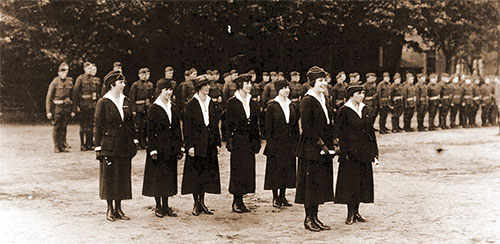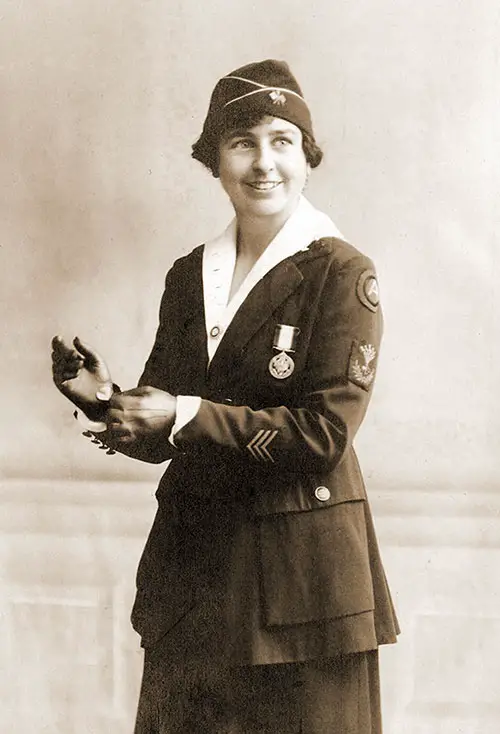How the Signal Corps Girls Stayed on the Job - 1919

Signal Corps Girls Receiving Recognition for the Work at the US Army Base Mainstrom, circa 1919. Back Row, First from Left is Grace D. Banker. GGA Image ID # 1997739222
Grace D. Banker, D.S.M. (Only American Woman in France Awarded This Medal)
Girl Who Kept Up Communications Between General Headquarters and the Battle Line Describes How Plucky Young Women, Sometimes Working in Bomb-Proof Shelters to Escape Air Raids, Made Best of Unfamiliar Phone Apparatus and Awkward Conditions and “Got Results”
And the Signal Corps girl stayed on the job.
This is why Miss Grace D. Banker, who has just returned from overseas to her home in Passaic, was personally decorated by Lt. Gen. Hunter Liggett with the Distinguished Service Medal, an honor given to no other American woman in France.
Her citation reads: “For exceedingly meritorious and distinguished service – by untiring devotion to her exacting duties under trying conditions—did much to assure the success of the hone system during the operations against the St. Mihiel salient and north of Verdun.”
The Story of how she kept up communications between General Headquarters and the far-flung battleline of the fighting First Army, speeding the orders that sent unit after unit of American boys over the top, working hour after hour with the most old-fashioned and inadequate telephone apparatus, eating army food and sleeping over a barn—was told to me yesterday by Miss Banker, as she sat in the Gloucester hammock on her screened and shaded plaza, surrounded by mother, sister, and blank angora cat and subjected to the crossfire of a newspaper man and a newspaper woman.
She still wore her service uniform of dark blue and her jaunty blue cap with the crossed flags. On her coat was a long bar of bright-colored service ribbons, with two tiny stars set on them.
She is a young woman—she was graduated from Barnard only a few years ago—rather over medium height, with black-lashed blue yes, crinkly black hair and white and even teeth. She smiles often, particularly when she is asked a question she does not want to answer.
“Personally, I think she should have been decorated for the discretion of the Sphinx and the modesty of the violet. My experiences while politely jimmying her fund of personal reminiscences for readers of The Evening World convinced me that the important American Army plans of battle which Miss Banker necessarily was entrusted were perfectly safe in her keeping.
Even if she had been captured, I do not believe there was any form of German frightfulness which would have made her tell what she chose not to tell.
“How did you win your decoration?” I asked. “What was you most thrilling experiences at the front? What were the hardest things you had to do?”
“I was not decorated for any one act or incident—don’t try to make me a heroine!” Miss Banker protested, with the pretty smile. “I suppose I won the citation just for being where I was wanted and staying there and doing the work.

Chief Operator, US Army Signal Corps Telephone Operators, Shown Here Shortly After Receiving the Distinguished Service Medal in Coblenz, Germany on 22 May 1919. Official US Army Signal Corps Photograph. GGA Image ID # 19ad61fc34
Why, really, it doesn’t seem to me I did anything worth telling about. I had a brother in the 4th Division, and when I think of what the men in the trenches went through, I feel as if my experiences were not even to be mentioned.”
“But weren’t you under shell-fire?” I persisted. “And weren’t you in danger from the aeroplanes during the bombing raids?”
“I positively refuse to do any bombing or shelling today,” she twinkled. “The war is fought! Yes, bombs did drop near us sometimes, but think of the girls in Paris who were menaced by the long-distance gun and who might expect a bomb any moonlight might.
“I had so much rather talk about the girls who were in the Signal Corps. They particularly dislike to be called “hello-girls” because that implies that they were merely telephone operators, when they were specially enlisted as members of the Signal Corps of the U. S. A. and most of them did all their telephoning after joining the service.
"Before that they were artists, sculptors, teachers—college women, for the most part. And they were so fine! Nobody overseas had anything but praise for the Signal Corps Girls.”
Miss Banker was in charge of a unit of some twenty girls when she went to France in March 1918. She was the first girl to join the Signal Corps after we went to war.
Before that she was not a telephone operator, as has been stated, but was an instructor in a school for telephone operators in Newark. Her expert knowledge of French was her primary qualification for service, although she knew all about the actual business of running a switchboard and took charge of General Pershing’s headquarters service at Chaumont as soon as she reached France.
She was there for five months, then was sent to the First Army and followed its headquarters through the St. Mihiel operations. Afterward, she was at Koblenz and during the peace negotiations, in Paris.
“There were six girls with me,” she took up the tale, after more urging from me and more hesitant smiles and lip-pursing from her. “Yes, of course we lived in the most primitive fashion while up at the front.
In Chaumont, we had had a charming house where all of us were quartered together, and later at Coblenz, we were delightfully comfortable. With the Army, however, we never knew where we should be billeted next.
Part of the time, we slept over a barn. Often, we were in the French barracks of stone, not too clean and with no comforts except a cot apiece and a wash basin between us.
Really, though, a cot makes a perfectly comfortable chair when you are tired. And there was this advantage about work with the First Army—when you were off duty, there was nowhere to go and nothing to do, so you could sleep.
Naturally, the tension under which we all worked was high, particularly just before a battle, when instructions were going on in every direction from headquarters.
“We ate canned willy and goldfish with the officers’ mess, and we did our own laundry work. I tried to give the girls an eight-hour day, but in a rush we all worked twice as long if necessary.
“We had to do without may telephone operating conveniences used in this country. We had French apparatus and old-fashioned apparatus, and instead of sitting on high stools, we had packing boxes—if we were lucky.
"Whenever there was though to be danger of an air raid, the men of the Signal Corps removed our boards from the barracks to the abris, the bomb-proof shelters. There we “plugged in” by candlelight.
“The connections between the commanding General and the various persons to whom he sent orders were made by us in the usual way. Communications were broken, of course, by the enemy, but I do not think we often got things mixed up.
"I knew a good deal about the plans for the advances, and yet many of the most important messages were sent in other ways, because the Germans could tap our wires too easily, a thing which we could not know even when it did happen.
It was a most wonderful year,” Miss Banker concluded seriously. “And if you were to ask every girl in my party about here hardships, I know she would answer that she had none worth mentioning—and that if she was afraid, at least she never said anything about it—and that her work overseas helped her in every way and made her a bigger person that she was before.”
Marguerite Mooers Marshall, “How the Signal Corps Girls Stayed on the Job,” in The New York Evening World, New York: The Press Publishing Company, Tuesday, 9 September 1919, p. 12, cols. 1-2.
